Eliza Knight's Blog, page 13
April 25, 2016
Video of the Week: Stunning Drone Footage: Soar Above Wild Scotland!
Enjoy this video of the week! Filmmaker John Duncan used drones to capture this stunning footage!
Published on April 25, 2016 04:32
April 22, 2016
Review & Giveaway: The Dark Lady's Mask
 The Dark Lady's Mask: A Novel of Shakespeare's Muse by Mary SharrattPublication Date: April 19, 2016Houghton Mifflin HarcourtHardcover, eBook, Audio Book; 416 PagesGenre: Historical Fiction
The Dark Lady's Mask: A Novel of Shakespeare's Muse by Mary SharrattPublication Date: April 19, 2016Houghton Mifflin HarcourtHardcover, eBook, Audio Book; 416 PagesGenre: Historical FictionABOUT THE BOOK:
Shakespeare in Love meets Shakespeare’s Sister in this novel of England’s first professional woman poet and her collaboration and love affair with William Shakespeare.
London, 1593. Aemilia Bassano Lanier is beautiful and accomplished, but her societal conformity ends there. She frequently cross-dresses to escape her loveless marriage and to gain freedoms only men enjoy, but a chance encounter with a ragged, little-known poet named Shakespeare changes everything.
Aemilia grabs at the chance to pursue her long-held dream of writing and the two outsiders strike up a literary bargain. They leave plague-ridden London for Italy, where they begin secretly writing comedies together and where Will falls in love with the beautiful country — and with Aemilia, his Dark Lady. Their Italian idyll, though, cannot last and their collaborative affair comes to a devastating end. Will gains fame and fortune for their plays back in London and years later publishes the sonnets mocking his former muse. Not one to stand by in humiliation, Aemilia takes up her own pen in her defense and in defense of all women.
The Dark Lady’s Mask gives voice to a real Renaissance woman in every sense of the word.
MY REVIEW:
This was a first of Mary Sharratt's books that I've read, and I can say quite enthusiastically that I am now a fan. The narrative language in the book was beautiful and poetic -- not to mention that there are actual poem's throughout. The banter witty, the storyline entertaining. There was a good mix of emotions throughout. Sadness, anger, laughter, love, and Ms. Sharratt did an excellent job of eliciting those emotions from me.
We first meet Aemilia as a young girl, trying to figure out where she belongs in her world (an ironic that later on she finds the place she thought she belonged the most is actually the place she feels most out of place). Her relationship with her father is loving and warm, as it appears at first to be with her mother and sister. When her sister marries, and the events that follow, sets a precedent for Aemilia on what a relationship should and shouldn't be, and it has a profound impact on many of the decisions that she makes. If not for her cousin Jasper sneaking her out of the house, dressed as a boy, to see her father perform in a play, and her father introducing her to the famous female poet at court, I don't think Aemilia would have felt empowered enough to go about her journey and reach for her dreams. She was hiding behind a mask long before she ever met Shakespeare. She's a woman not only trying to live in a man's world, but trying to break into a man's profession. It is not enough to be a famous poet, she wants to be a playwright, and luckily, her friendship with Shakespeare, initially, helps get her what she want, even if it is a veiled execution. (And I have to add, but the way, that I thought it quite hilarious Shakepeare's border in the beginning calls him Master Shakestaff. If that isn't an insult! There are so many little funny quips in this book!). But not all good things last... Fortunately for us, Aemilia is a driven, determined and risk taking woman. She was a feminist before her time--although I can't say she's the first, as for the years of her formative life she was exposed to one of the most powerful feminists of all time--Elizabeth I.
I was impressed with how smoothly and seamlessly Ms. Sharratt brought all the players into each other's world. About 1/3 of the way into the book, I was skipping to the back to read the author's note, because I was convinced that this was a true story, and I so very much wanted it to be. Her grasp of language, scenery, history, was amazing. I can't say enough good things about this book.
I highly recommend you add it to your TO BE READ list, because it was fantastic. It was a fast-paced read that I couldn't put down.
**Leave a comment for your chance to win a paperback copy of this book! Open to US residents only.**READ AN EXCERPT

Amazon (Kindle) | Amazon (Hardcover) | Amazon UK | Barnes & Noble
Advance Praise“An exquisite portrait of a Renaissance woman pursuing her artistic destiny in England and Italy, who may — or may not — be Shakespeare’s Dark Lady.”— MARGARET GEORGE, internationally bestselling author of Elizabeth I
“Perfectly chosen details and masterful characterization bring to life this swiftly moving, elegant story. As atmospheric and compelling as it is wise, The Dark Lady’s Mask is a gem not to be missed.”— LYNN CULLEN, bestselling author of Mrs. Poe and Twain’s End
“Mary Sharratt’s enchanting new novel, The Dark Lady’s Mask, is a richly imagined, intensely romantic and meticulously researched homage to lauded poet, Aemilia Bassano Lanyer, an accomplished woman of letters who many believe to be Shakespeare’s Eternal Muse. Sharratt unfolds a captivating tale, a compelling ‘what if ’ scenario, of a secret union that fed the creative fires of England’s greatest poet and playwright.”— KATHLEEN KENT, bestselling author of The Heretic’s Daughter
“Mary Sharratt is a magician. This novel transports the reader to Elizabethan England with a tale of the bard and his love that is nothing short of amazing. Absorbing, emotional, historically fascinating. A work of marvelous ingenuity!”— M.J. ROSE, New York Times bestselling author of The Witch of PaintedSorrows
“I enjoyed this exciting fantasy of Shakespeare’s ‘dark lady.’ There was adventure, betrayal, resilience, and above all, the fun notion that Shakespeare might have had far more than a muse to help him create his wonderful plays.”—KARLEEN KOEN, bestselling author of Dark Angels and Before Versailles
“Through the story of Aemilia Bassano, a talented musician and poet, Mary Sharratt deftly tackles issues of religious and gender inequality in a time of brutal conformity. The Dark Lady’s Mask beautifully depicts the exhilaration and pitfalls of subterfuge, a gifted woman’s precarious reliance on the desires of powerful men, and the toll paid by unrecognized artistic collaborators. Resonant and moving.”—MITCHELL JAMES KAPLAN, author of By Fire, By Water
“In The Dark Lady’s Mask, Mary Sharratt seduces us with a most tantalizing scenario —that the bold, cross-dressing poet and feminist writer Aemilia Bassano is Shakespeare’s mysterious muse, the Dark Lady. Romantic, heart-breaking, and rich in vivid historical detail and teeming Elizabethan life, the novel forms an elegant tapestry of the complexities, joys, and sorrows of being both a female and an artist.”—KAREN ESSEX, author of Leonardo’s Swans and Dracula in Love
“Mary Sharratt has created an enchanting Elizabethan heroine, a musician, the orphaned daughter of a Jewish Italian refugee who must hide her heritage for her safety. Taken up by powerful men for her beauty, Amelia has wit and daring and poetry inside her that will make her a match for young Will Shakespeare himself and yet she must hide behind many masks to survive in a world where women have as much talent as men but little power.”— STEPHANIE COWELL, author of Claude & Camille: A Novel of Monet
“Prepare to be swept away by Mary Sharratt’s latest foray into historical fiction. Inspired by the true story of poet, Aemilia Bassano, THE DARK LADY’S MASK explores her relationship with William Shakespeare. Richly detailed and well researched, this lush tale brings Aemilia out of the shadows of history and let’s her emerge as one of the founding mothers of literature. Drama, intrigue, and romance will have readers racing through this brilliant celebration of the muse.”— PAMELA KLINGER-HORN, Sales & Outreach Coordinator, Excelsior Bay Books
 About the AuthorMARY SHARRATT is an American writer who has lived in the Pendle region of Lancashire, England, for the past seven years. The author of the critically acclaimed novels Summit Avenue, The Real Minerva, and The Vanishing Point, Sharratt is also the co-editor of the subversive fiction anthology Bitch Lit, a celebration of female antiheroes, strong women who break all the rules.
About the AuthorMARY SHARRATT is an American writer who has lived in the Pendle region of Lancashire, England, for the past seven years. The author of the critically acclaimed novels Summit Avenue, The Real Minerva, and The Vanishing Point, Sharratt is also the co-editor of the subversive fiction anthology Bitch Lit, a celebration of female antiheroes, strong women who break all the rules. Website | Facebook | Twitter | GoodreadsBlog Tour ScheduleTuesday, April 19
Review & Giveaway at Unshelfish
Review at Oh, for the Hook of a Book!
Wednesday, April 20
Review at A Bookish Affair
Interview at Oh, for the Hook of a Book!
Excerpt & Giveaway at A Literary Vacation
Thursday, April 21
Review at A Book Drunkard
Guest Post at A Bookish Affair
Interview at Books and Benches
Friday, April 22
Review & Giveaway at History Undressed
Monday, April 25
Review at Seize the Words: Books in Review
Tuesday, April 26
Review at With Her Nose Stuck In A Book
Guest Post & Giveaway at Let Them Read Books
Wednesday, April 27
Review at Ageless Pages Reviews
Thursday, April 28
Review at Just One More Chapter
Friday, April 29
Review at A Chick Who Reads
Saturday, April 30
Review at Queen of All She Reads
Monday, May 2
Review at Flashlight Commentary
Review at Cynthia Robertson, writer
Tuesday, May 3
Interview at Flashlight Commentary
Wednesday, May 4
Review at So Many Books, So Little Time
Thursday, May 5
Excerpt & Giveaway at Teddy Rose Book Reviews Plus More
Friday, May 6
Review at Book Nerd
Monday, May 9
Review at A Dream within a Dream
Tuesday, May 10
Character Interview at Boom Baby Reviews
Wednesday, May 11
Review at Puddletown Reviews
Thursday, May 12
Review & Giveaway at View from the Birdhouse
Friday, May 13
Review at First Impressions Reviews
Excerpt at Layered Pages
Monday, May 16
Review at A Book Geek
Tuesday, May 17
Giveaway at Passages to the Past
Wednesday, May 18
Review at History From a Woman's Perspective
Thursday, May 19
Review & Giveaway at One Book Shy of a Full Shelf
Friday, May 20
Review at Broken Teepee

Published on April 22, 2016 08:48
April 19, 2016
Bold...Brilliant...Brave... Heroines Throughout History: ACTRESS LAURA KEENE by Tara Kingston
Welcome back to History Undressed our regular third Tuesday guest blogger, Tara Kingston! Today she's written another Bold, Brilliant and Brave heroine! And actress! I hope you enjoy it as much as I did!
Bold...Brilliant...Brave...Heroines Throughout HistoryACTRESS LAURA KEENEby Tara Kingston
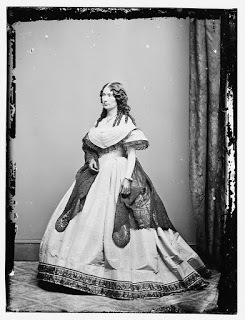
Greetings! I’m Tara Kingston, historical romance author and lover of all things Victorian. I’m fascinated by history through the ages, especially the bold, brilliant women who helped shape our world, and I’m delighted to be a monthly contributor to History Undressed. I’ll be sharing facts about daring women through history—some famous, some not so well-known, but all remarkable with their own unique contributions. Today, I’m taking a look at actress Laura Keene, a witness to the assassination of Abraham Lincoln.
Our American Cousin…a rather bland title for a comedic stage play that has been forever connected to one of the most infamous acts in American history, the assassination of Abraham Lincoln. The star of that play, Laura Keene, is perhaps best known for her performance in that play and the comfort she may have offered the stricken President after he suffered his mortal wound, but she made her mark on the theater world long before that tragic night, becoming a powerful theater manager in New York during the Victorian era.

~ Born in England on July 20, 1826, the former Mary Frances Moss was a young mother of two daughters when her husband, a former British Army officer, was convicted of a crime and reportedly sent to Australia on a convict ship. On her own and without funds, she followed the footsteps of her aunt, British actress Elizabeth Yates and embarked upon a career as an actress.
~ Changing her name to Laura Keene, she made her professional debut in London in 1851. Other rolls followed, and a year later, she traveled to America to become the leading lady of a stock company at Wallack’s Theater in New York. After little more than a year with at Wallack’s, Laura Keene left the stock company and leased a Baltimore theater for her performances, then traveled to California and Australia as a touring performer.

~ Laura Keene toured in Australia with Edwin Booth, brother of assassin John Wilkes Booth.
~Returning to New York in 1855, she leased the Metropolitan Theater, renaming it Laura Keene’s Varieties and serving as manager, director, and star, becoming the first female American theater manager. The following year, she oversaw construction of her own theater. Laura Keene’s Theater opened on November 18, 1856, and it was here that the play Our American Cousin made its debut in 1858.
~ After President Lincoln was shot by assassin John Wilkes Booth, legend has it that Laura Keene offered comfort to the wounded man, cradling his head on her lap, thereby staining her dress with his blood.
Sources:http://www.biography.com/people/laura... http://www.fords.org/laura-keene http://www.britannica.com/biography/Laura-Keene https://en.wikipedia.org/wiki/Laura_Keene
All photographs are in the public domain.
Harvard Theatre Collection Image of Laura Keene source: TS 939.5.3, Harvard Theatre Collection, Houghton Library, Harvard University
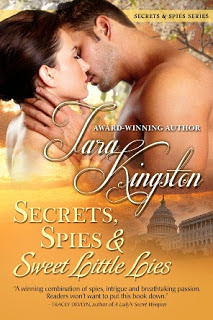 About The Author:
About The Author:
Award-winning author Tara Kingston writes historical romance laced with intrigue, danger, and adventures of the heart. A Southern belle-out-of-water in a quaint Pennsylvania town, she lives her own love story with her real-life hero in a cozy Victorian. The mother of two sons, Tara's a former librarian whose love of books is evident in her popping-at-the-seams bookcases. It goes without saying that Tara's husband is thankful for the invention of digital books, thereby eliminating the need for yet another set of shelves. When she's not writing, reading, or burning dinner, Tara enjoys cycling, hiking, and cheering on her favorite football team. Connect with Tara at www.tarakingston.com and on Facebook: https://www.facebook.com/AuthorTaraKingston
In a world where a man’s loyalty doesn’t depend on the color of a uniform, danger, intrigue, and passion are facts of life for the men and women of Tara’s Secrets & Spies series, historical romances set against the backdrop of the Civil War.
Bold...Brilliant...Brave...Heroines Throughout HistoryACTRESS LAURA KEENEby Tara Kingston

Greetings! I’m Tara Kingston, historical romance author and lover of all things Victorian. I’m fascinated by history through the ages, especially the bold, brilliant women who helped shape our world, and I’m delighted to be a monthly contributor to History Undressed. I’ll be sharing facts about daring women through history—some famous, some not so well-known, but all remarkable with their own unique contributions. Today, I’m taking a look at actress Laura Keene, a witness to the assassination of Abraham Lincoln.
Our American Cousin…a rather bland title for a comedic stage play that has been forever connected to one of the most infamous acts in American history, the assassination of Abraham Lincoln. The star of that play, Laura Keene, is perhaps best known for her performance in that play and the comfort she may have offered the stricken President after he suffered his mortal wound, but she made her mark on the theater world long before that tragic night, becoming a powerful theater manager in New York during the Victorian era.

~ Born in England on July 20, 1826, the former Mary Frances Moss was a young mother of two daughters when her husband, a former British Army officer, was convicted of a crime and reportedly sent to Australia on a convict ship. On her own and without funds, she followed the footsteps of her aunt, British actress Elizabeth Yates and embarked upon a career as an actress.
~ Changing her name to Laura Keene, she made her professional debut in London in 1851. Other rolls followed, and a year later, she traveled to America to become the leading lady of a stock company at Wallack’s Theater in New York. After little more than a year with at Wallack’s, Laura Keene left the stock company and leased a Baltimore theater for her performances, then traveled to California and Australia as a touring performer.

~ Laura Keene toured in Australia with Edwin Booth, brother of assassin John Wilkes Booth.
~Returning to New York in 1855, she leased the Metropolitan Theater, renaming it Laura Keene’s Varieties and serving as manager, director, and star, becoming the first female American theater manager. The following year, she oversaw construction of her own theater. Laura Keene’s Theater opened on November 18, 1856, and it was here that the play Our American Cousin made its debut in 1858.
~ After President Lincoln was shot by assassin John Wilkes Booth, legend has it that Laura Keene offered comfort to the wounded man, cradling his head on her lap, thereby staining her dress with his blood.
Sources:http://www.biography.com/people/laura... http://www.fords.org/laura-keene http://www.britannica.com/biography/Laura-Keene https://en.wikipedia.org/wiki/Laura_Keene
All photographs are in the public domain.
Harvard Theatre Collection Image of Laura Keene source: TS 939.5.3, Harvard Theatre Collection, Houghton Library, Harvard University
 About The Author:
About The Author:Award-winning author Tara Kingston writes historical romance laced with intrigue, danger, and adventures of the heart. A Southern belle-out-of-water in a quaint Pennsylvania town, she lives her own love story with her real-life hero in a cozy Victorian. The mother of two sons, Tara's a former librarian whose love of books is evident in her popping-at-the-seams bookcases. It goes without saying that Tara's husband is thankful for the invention of digital books, thereby eliminating the need for yet another set of shelves. When she's not writing, reading, or burning dinner, Tara enjoys cycling, hiking, and cheering on her favorite football team. Connect with Tara at www.tarakingston.com and on Facebook: https://www.facebook.com/AuthorTaraKingston
In a world where a man’s loyalty doesn’t depend on the color of a uniform, danger, intrigue, and passion are facts of life for the men and women of Tara’s Secrets & Spies series, historical romances set against the backdrop of the Civil War.
Published on April 19, 2016 04:22
April 13, 2016
The First Woman Hung by the US Government by Susan Higginbotham
Welcome to History Undressed, historical fiction author, Susan Higginbotham! She's written us a fabulous post on Mary Surratt, who is featured in her new novel, Hanging Mary!
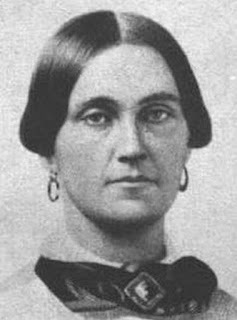 Mary SurrattOn July 7, 1865, Mary Surratt achieved a dubious distinction: becoming the first woman to be hanged by the United States government. Nothing about Mary Surratt's past marked her as a likely candidate for the hangman. Born in 1823 to Archibald and Elizabeth Jenkins to a farming family in Prince George's County, Maryland, Mary was sent to the Catholic-run Academy for Young Ladies across the Potomac River in Alexandria, Virginia. So impressed was young Mary by those who taught her that she converted to Catholicism, taking the name of Maria Eugenia Jenkins. In 1840, at age seventeen, Mary wed John Harrison Surratt, who was ten years older and had been adopted by a prosperous family. The couple had three children: Isaac, Anna, and John Jr. A fire destroyed the couple's home in 1851. Instead of rebuilding, John Sr. elected to construct a tavern in Prince George's County as a stopping place for those coming to and from nearby Washington, D.C. Not only would his decision prove disastrous to Mary in the long run, tavern-keeping was the worst possible vocation for John, an alcoholic who now could spend as much time behind his bar as he pleased. As John's drinking grew worse, Mary began to despair of the influence it and the atmosphere of the tavern were having on their three children. With the assistance of various priests who arranged for reduced tuition, she managed to send them to Catholic boarding schools. One of the priests whose help she enlisted was the Italian-born Rev. Joseph Maria Finotti. As priest and parishioner, he and Mary had become so close that gossip began to circulate. Father Finotti was transferred to Massachusetts, although Mary continued to write to him occasionally, confiding in him about her husband's drunken conduct and her concern for her children. In 1860, the talk in John Surratt's bar would have centered around the likelihood of civil war, and the upcoming presidential election. One of the polling places in Prince George's County was the Surratt tavern. When the votes were counted on Election Day, not a single one was for Abraham Lincoln. When war broke out the following year, Isaac, Mary's oldest son, joined the Confederate army. He was not an anomaly: although Maryland stayed within the union, many of its citizens sided with the South, and Prince George's County and the rest of southern Maryland were particularly pro-Confederate. Soon the Surratt tavern became known as a "safe house" for those engaged in running the blockade between North and South. Because the tavern served as a post office as well--giving the small crossroads its name of Surrattsville--it could also serve as a drop for clandestine mail.
Mary SurrattOn July 7, 1865, Mary Surratt achieved a dubious distinction: becoming the first woman to be hanged by the United States government. Nothing about Mary Surratt's past marked her as a likely candidate for the hangman. Born in 1823 to Archibald and Elizabeth Jenkins to a farming family in Prince George's County, Maryland, Mary was sent to the Catholic-run Academy for Young Ladies across the Potomac River in Alexandria, Virginia. So impressed was young Mary by those who taught her that she converted to Catholicism, taking the name of Maria Eugenia Jenkins. In 1840, at age seventeen, Mary wed John Harrison Surratt, who was ten years older and had been adopted by a prosperous family. The couple had three children: Isaac, Anna, and John Jr. A fire destroyed the couple's home in 1851. Instead of rebuilding, John Sr. elected to construct a tavern in Prince George's County as a stopping place for those coming to and from nearby Washington, D.C. Not only would his decision prove disastrous to Mary in the long run, tavern-keeping was the worst possible vocation for John, an alcoholic who now could spend as much time behind his bar as he pleased. As John's drinking grew worse, Mary began to despair of the influence it and the atmosphere of the tavern were having on their three children. With the assistance of various priests who arranged for reduced tuition, she managed to send them to Catholic boarding schools. One of the priests whose help she enlisted was the Italian-born Rev. Joseph Maria Finotti. As priest and parishioner, he and Mary had become so close that gossip began to circulate. Father Finotti was transferred to Massachusetts, although Mary continued to write to him occasionally, confiding in him about her husband's drunken conduct and her concern for her children. In 1860, the talk in John Surratt's bar would have centered around the likelihood of civil war, and the upcoming presidential election. One of the polling places in Prince George's County was the Surratt tavern. When the votes were counted on Election Day, not a single one was for Abraham Lincoln. When war broke out the following year, Isaac, Mary's oldest son, joined the Confederate army. He was not an anomaly: although Maryland stayed within the union, many of its citizens sided with the South, and Prince George's County and the rest of southern Maryland were particularly pro-Confederate. Soon the Surratt tavern became known as a "safe house" for those engaged in running the blockade between North and South. Because the tavern served as a post office as well--giving the small crossroads its name of Surrattsville--it could also serve as a drop for clandestine mail.
 Mary's H Street Boarding HouseIn 1862, John Surratt suddenly died, leaving Mary Surratt heavily in debt but with two properties: the tavern and a house on H Street in Washington. When Maryland adopted a constitutional provision in 1864 freeing that state's slaves, Mary decided to lease the tavern and move into the H Street house herself. There, she would take in boarders--a respectable and common activity for those in need of extra income. Mary's younger children, Anna and John, went to Washington with her. The latter was not around much, for he had begun to carry clandestine mail from North to South. Soon the boarders came. Like their landlady, they were ordinary, middle-class people: a classmate of John Surratt's who worked as a clerk for the War Department, a young lady straight out of boarding school, a Catholic schoolgirl, and a married couple and their two children. Just a few months later, some of them would be in prison, and one would be the star witness at the trial of the century. During the rest of 1864, life went on in the boardinghouse just as it did in the many other boardinghouses that dotted wartime Washington. Then, early in 1865, John Surratt brought home a new acquaintance: the actor John Wilkes Booth, the heartthrob of his day. Soon Booth was stopping by the boardinghouse regularly. Sometimes he would sit in the parlor and converse with the ladies; other times he would confer with John Surratt privately. Often he visited even when John Surratt was away from home. Around the same time Booth began frequenting the boardinghouse, a stream of odd guests began to appear, staying for only a few nights at a time. One man came twice, calling himself Mr. Wood on the first occasion and Mr. Payne on the second. Another, whose German surname no one could pronounce, was scruffy and disreputable looking. A lady guest kept her face shielded by a veil. One boarder, John Surratt's school chum Louis Weichmann, began to wonder just what was going on--and he began to wonder even more when, one day in March, John Surratt, Booth, and Payne, agitated and waving weapons about, stormed into the room Weichmann shared with Surratt, then abruptly adjourned to the privacy of the attic. In fact, the men were plotting the kidnapping of President Lincoln. Their scheme failed, but the next month, on April 14, 1865, Booth changed history with a single derringer shot at Ford's Theater. At about the same time, just blocks away, a powerfully built man forced his way into the home of the Secretary of State, William Seward, who was recovering from a carriage accident, and attacked him in his bed. Within hours of the assassination and the assault on Seward (who survived), police, tipped off that Booth had spent a lot of time at H Street, turned up at Mary Surratt's boardinghouse. They searched the house but left after finding no sign of Booth or John Surratt, who was suspected of the assault on Seward. By the late evening of April 17, however, military authorities had acquired more evidence. They again came to the boardinghouse. This time, they took Mary and all those staying with her at the time into custody. As the party awaited transportation to Washington's military headquarters, a man in grubby but well-made clothes turned up at the door with the unlikely excuse that he had come to dig a ditch for Mary the following morning. Asked to identify him, Mary swore she had never seen him before. In fact, she had seen him several times: he was the Mr. Payne who had stayed at her house just a month before. He was also, Seward's servant soon confirmed, the man who had assaulted the Secretary of State.
Mary's H Street Boarding HouseIn 1862, John Surratt suddenly died, leaving Mary Surratt heavily in debt but with two properties: the tavern and a house on H Street in Washington. When Maryland adopted a constitutional provision in 1864 freeing that state's slaves, Mary decided to lease the tavern and move into the H Street house herself. There, she would take in boarders--a respectable and common activity for those in need of extra income. Mary's younger children, Anna and John, went to Washington with her. The latter was not around much, for he had begun to carry clandestine mail from North to South. Soon the boarders came. Like their landlady, they were ordinary, middle-class people: a classmate of John Surratt's who worked as a clerk for the War Department, a young lady straight out of boarding school, a Catholic schoolgirl, and a married couple and their two children. Just a few months later, some of them would be in prison, and one would be the star witness at the trial of the century. During the rest of 1864, life went on in the boardinghouse just as it did in the many other boardinghouses that dotted wartime Washington. Then, early in 1865, John Surratt brought home a new acquaintance: the actor John Wilkes Booth, the heartthrob of his day. Soon Booth was stopping by the boardinghouse regularly. Sometimes he would sit in the parlor and converse with the ladies; other times he would confer with John Surratt privately. Often he visited even when John Surratt was away from home. Around the same time Booth began frequenting the boardinghouse, a stream of odd guests began to appear, staying for only a few nights at a time. One man came twice, calling himself Mr. Wood on the first occasion and Mr. Payne on the second. Another, whose German surname no one could pronounce, was scruffy and disreputable looking. A lady guest kept her face shielded by a veil. One boarder, John Surratt's school chum Louis Weichmann, began to wonder just what was going on--and he began to wonder even more when, one day in March, John Surratt, Booth, and Payne, agitated and waving weapons about, stormed into the room Weichmann shared with Surratt, then abruptly adjourned to the privacy of the attic. In fact, the men were plotting the kidnapping of President Lincoln. Their scheme failed, but the next month, on April 14, 1865, Booth changed history with a single derringer shot at Ford's Theater. At about the same time, just blocks away, a powerfully built man forced his way into the home of the Secretary of State, William Seward, who was recovering from a carriage accident, and attacked him in his bed. Within hours of the assassination and the assault on Seward (who survived), police, tipped off that Booth had spent a lot of time at H Street, turned up at Mary Surratt's boardinghouse. They searched the house but left after finding no sign of Booth or John Surratt, who was suspected of the assault on Seward. By the late evening of April 17, however, military authorities had acquired more evidence. They again came to the boardinghouse. This time, they took Mary and all those staying with her at the time into custody. As the party awaited transportation to Washington's military headquarters, a man in grubby but well-made clothes turned up at the door with the unlikely excuse that he had come to dig a ditch for Mary the following morning. Asked to identify him, Mary swore she had never seen him before. In fact, she had seen him several times: he was the Mr. Payne who had stayed at her house just a month before. He was also, Seward's servant soon confirmed, the man who had assaulted the Secretary of State.
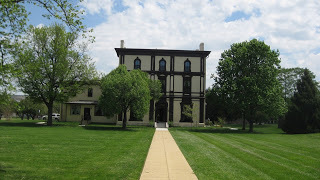 The building in which her trial was held,in what is now Fort McNair army base. By the time federal authorities caught and killed Booth in Virginia, Mary, Payne (whose actual name was Lewis Powell), and six others had been identified as his co-conspirators. While the evidence against Powell was ironclad, the cases against some of his codefendants were weaker, and it was decided to try the eight before a military commission (which did not require a unanimous verdict to convict) instead of in a civilian court. The trial began in May 1865. The chief witnesses against Mary were her former boarder, Lewis Weichmann, and her tenant at her Maryland tavern, John Lloyd. They testified to two particularly damning incidents: on April 11, three days before the assassination, Weichmann had driven Mary to her tavern, ostensibly for Mary to meet with a man who owed her money. On the way, they met Lloyd, to whom Mary gave a message: to have some "shooting irons" ready for a party who would soon call for them. Worse, on the day of the assassination itself, Mary had received a visit from Booth. Having heard that she was going to the tavern again, he had given her a package to hand to Lloyd, along with a message: to have the guns ready, along with some whiskey, as they would be called for that very evening. Indeed, Booth and his companion, a David Herold, did turn up at the tavern that evening and called for the guns and whiskey, as well as the package, which contained a field glass. Also weighing against Mary was her suspicious claim not to have recognized Powell, who had stayed at her own house.
The building in which her trial was held,in what is now Fort McNair army base. By the time federal authorities caught and killed Booth in Virginia, Mary, Payne (whose actual name was Lewis Powell), and six others had been identified as his co-conspirators. While the evidence against Powell was ironclad, the cases against some of his codefendants were weaker, and it was decided to try the eight before a military commission (which did not require a unanimous verdict to convict) instead of in a civilian court. The trial began in May 1865. The chief witnesses against Mary were her former boarder, Lewis Weichmann, and her tenant at her Maryland tavern, John Lloyd. They testified to two particularly damning incidents: on April 11, three days before the assassination, Weichmann had driven Mary to her tavern, ostensibly for Mary to meet with a man who owed her money. On the way, they met Lloyd, to whom Mary gave a message: to have some "shooting irons" ready for a party who would soon call for them. Worse, on the day of the assassination itself, Mary had received a visit from Booth. Having heard that she was going to the tavern again, he had given her a package to hand to Lloyd, along with a message: to have the guns ready, along with some whiskey, as they would be called for that very evening. Indeed, Booth and his companion, a David Herold, did turn up at the tavern that evening and called for the guns and whiskey, as well as the package, which contained a field glass. Also weighing against Mary was her suspicious claim not to have recognized Powell, who had stayed at her own house.
Neither Lloyd nor Weichmann was an ideal witness, however. By all accounts, Lloyd was a heavy drinker who had been drunk when Mary saw him that fatal Good Friday, though how incapacitated he had been was debatable. Weichmann, though sober and steady, was compromised himself. He had been close friends with John Surratt and had got on well with another defendant, George Atzerodt. One witness claimed that he had shared War Department records with John Surratt and his Confederate friends, and John Surratt later insisted that Weichmann had wanted to join the conspiracy but was disqualified because he could neither ride a horse nor shoot a gun. Some believed that had Weichmann not testified so freely against his landlady, he would have been on trial himself.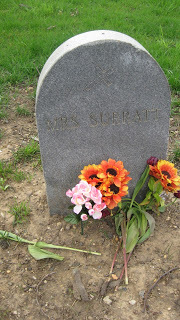 Mary's tombstone in Mt. Olivet Cemetery in Washington, D.C For all of their shortcomings, however, both witnesses were enough to convince a majority of the commissioners that Mary Surratt was guilty of conspiring to murder the President. Along with Powell, Atzerodt, and Herold, she went to the gallows on a brutally hot day in July, protesting her innocence to the end.
Mary's tombstone in Mt. Olivet Cemetery in Washington, D.C For all of their shortcomings, however, both witnesses were enough to convince a majority of the commissioners that Mary Surratt was guilty of conspiring to murder the President. Along with Powell, Atzerodt, and Herold, she went to the gallows on a brutally hot day in July, protesting her innocence to the end.
John Surratt, who had been on a mission for the Confederacy at the time of the assassination and who had gone into hiding upon learning that he was a suspect, was eventually captured and tried in 1867 by a civilian jury, which was unable to agree on a verdict. An attempt at retrying him failed for technical reasons, and John went free. Though after concluding an ill-received lecture tour, he largely kept silent on the topic of his mother, John gave vent to his feelings on one occasion. Faced with a routine question on an insurance application about how his mother died, he bitterly wrote, "She was murdered by the United States government."
For my own thoughts on Mary Surratt's guilt or innocence, please read my new historical novel, Hanging Mary, told by Mary and by her young boarder, Nora Fitzpatrick.
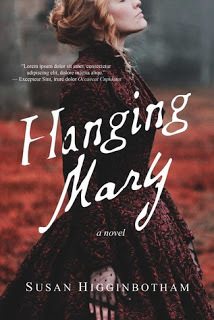 Check out Ms. Higginbotham's newest novel, Hanging Mary!
Check out Ms. Higginbotham's newest novel, Hanging Mary!
The untold story of Lincoln's Assassination
1864, Washington City. One has to be careful with talk of secession, of Confederate whispers falling on Northern ears. Better to speak only when in the company of the trustworthy. Like Mrs. Surratt.A widow who runs a small boardinghouse on H Street, Mary Surratt isn't half as committed to the cause as her son, Johnny. If he's not delivering messages or escorting veiled spies, he's invited home men like John Wilkes Booth, the actor who is even more charming in person than he is on the stage.But when President Lincoln is killed, the question of what Mary knew becomes more important than anything else. Was she a cold-blooded accomplice? Just how far would she go to help her son? Based on the true case of Mary Surratt, Hanging Mary reveals the untold story of those on the other side of the assassin's gun.
Amazon / AmazonUK / Barnes and Noble
 Mary SurrattOn July 7, 1865, Mary Surratt achieved a dubious distinction: becoming the first woman to be hanged by the United States government. Nothing about Mary Surratt's past marked her as a likely candidate for the hangman. Born in 1823 to Archibald and Elizabeth Jenkins to a farming family in Prince George's County, Maryland, Mary was sent to the Catholic-run Academy for Young Ladies across the Potomac River in Alexandria, Virginia. So impressed was young Mary by those who taught her that she converted to Catholicism, taking the name of Maria Eugenia Jenkins. In 1840, at age seventeen, Mary wed John Harrison Surratt, who was ten years older and had been adopted by a prosperous family. The couple had three children: Isaac, Anna, and John Jr. A fire destroyed the couple's home in 1851. Instead of rebuilding, John Sr. elected to construct a tavern in Prince George's County as a stopping place for those coming to and from nearby Washington, D.C. Not only would his decision prove disastrous to Mary in the long run, tavern-keeping was the worst possible vocation for John, an alcoholic who now could spend as much time behind his bar as he pleased. As John's drinking grew worse, Mary began to despair of the influence it and the atmosphere of the tavern were having on their three children. With the assistance of various priests who arranged for reduced tuition, she managed to send them to Catholic boarding schools. One of the priests whose help she enlisted was the Italian-born Rev. Joseph Maria Finotti. As priest and parishioner, he and Mary had become so close that gossip began to circulate. Father Finotti was transferred to Massachusetts, although Mary continued to write to him occasionally, confiding in him about her husband's drunken conduct and her concern for her children. In 1860, the talk in John Surratt's bar would have centered around the likelihood of civil war, and the upcoming presidential election. One of the polling places in Prince George's County was the Surratt tavern. When the votes were counted on Election Day, not a single one was for Abraham Lincoln. When war broke out the following year, Isaac, Mary's oldest son, joined the Confederate army. He was not an anomaly: although Maryland stayed within the union, many of its citizens sided with the South, and Prince George's County and the rest of southern Maryland were particularly pro-Confederate. Soon the Surratt tavern became known as a "safe house" for those engaged in running the blockade between North and South. Because the tavern served as a post office as well--giving the small crossroads its name of Surrattsville--it could also serve as a drop for clandestine mail.
Mary SurrattOn July 7, 1865, Mary Surratt achieved a dubious distinction: becoming the first woman to be hanged by the United States government. Nothing about Mary Surratt's past marked her as a likely candidate for the hangman. Born in 1823 to Archibald and Elizabeth Jenkins to a farming family in Prince George's County, Maryland, Mary was sent to the Catholic-run Academy for Young Ladies across the Potomac River in Alexandria, Virginia. So impressed was young Mary by those who taught her that she converted to Catholicism, taking the name of Maria Eugenia Jenkins. In 1840, at age seventeen, Mary wed John Harrison Surratt, who was ten years older and had been adopted by a prosperous family. The couple had three children: Isaac, Anna, and John Jr. A fire destroyed the couple's home in 1851. Instead of rebuilding, John Sr. elected to construct a tavern in Prince George's County as a stopping place for those coming to and from nearby Washington, D.C. Not only would his decision prove disastrous to Mary in the long run, tavern-keeping was the worst possible vocation for John, an alcoholic who now could spend as much time behind his bar as he pleased. As John's drinking grew worse, Mary began to despair of the influence it and the atmosphere of the tavern were having on their three children. With the assistance of various priests who arranged for reduced tuition, she managed to send them to Catholic boarding schools. One of the priests whose help she enlisted was the Italian-born Rev. Joseph Maria Finotti. As priest and parishioner, he and Mary had become so close that gossip began to circulate. Father Finotti was transferred to Massachusetts, although Mary continued to write to him occasionally, confiding in him about her husband's drunken conduct and her concern for her children. In 1860, the talk in John Surratt's bar would have centered around the likelihood of civil war, and the upcoming presidential election. One of the polling places in Prince George's County was the Surratt tavern. When the votes were counted on Election Day, not a single one was for Abraham Lincoln. When war broke out the following year, Isaac, Mary's oldest son, joined the Confederate army. He was not an anomaly: although Maryland stayed within the union, many of its citizens sided with the South, and Prince George's County and the rest of southern Maryland were particularly pro-Confederate. Soon the Surratt tavern became known as a "safe house" for those engaged in running the blockade between North and South. Because the tavern served as a post office as well--giving the small crossroads its name of Surrattsville--it could also serve as a drop for clandestine mail.
 Mary's H Street Boarding HouseIn 1862, John Surratt suddenly died, leaving Mary Surratt heavily in debt but with two properties: the tavern and a house on H Street in Washington. When Maryland adopted a constitutional provision in 1864 freeing that state's slaves, Mary decided to lease the tavern and move into the H Street house herself. There, she would take in boarders--a respectable and common activity for those in need of extra income. Mary's younger children, Anna and John, went to Washington with her. The latter was not around much, for he had begun to carry clandestine mail from North to South. Soon the boarders came. Like their landlady, they were ordinary, middle-class people: a classmate of John Surratt's who worked as a clerk for the War Department, a young lady straight out of boarding school, a Catholic schoolgirl, and a married couple and their two children. Just a few months later, some of them would be in prison, and one would be the star witness at the trial of the century. During the rest of 1864, life went on in the boardinghouse just as it did in the many other boardinghouses that dotted wartime Washington. Then, early in 1865, John Surratt brought home a new acquaintance: the actor John Wilkes Booth, the heartthrob of his day. Soon Booth was stopping by the boardinghouse regularly. Sometimes he would sit in the parlor and converse with the ladies; other times he would confer with John Surratt privately. Often he visited even when John Surratt was away from home. Around the same time Booth began frequenting the boardinghouse, a stream of odd guests began to appear, staying for only a few nights at a time. One man came twice, calling himself Mr. Wood on the first occasion and Mr. Payne on the second. Another, whose German surname no one could pronounce, was scruffy and disreputable looking. A lady guest kept her face shielded by a veil. One boarder, John Surratt's school chum Louis Weichmann, began to wonder just what was going on--and he began to wonder even more when, one day in March, John Surratt, Booth, and Payne, agitated and waving weapons about, stormed into the room Weichmann shared with Surratt, then abruptly adjourned to the privacy of the attic. In fact, the men were plotting the kidnapping of President Lincoln. Their scheme failed, but the next month, on April 14, 1865, Booth changed history with a single derringer shot at Ford's Theater. At about the same time, just blocks away, a powerfully built man forced his way into the home of the Secretary of State, William Seward, who was recovering from a carriage accident, and attacked him in his bed. Within hours of the assassination and the assault on Seward (who survived), police, tipped off that Booth had spent a lot of time at H Street, turned up at Mary Surratt's boardinghouse. They searched the house but left after finding no sign of Booth or John Surratt, who was suspected of the assault on Seward. By the late evening of April 17, however, military authorities had acquired more evidence. They again came to the boardinghouse. This time, they took Mary and all those staying with her at the time into custody. As the party awaited transportation to Washington's military headquarters, a man in grubby but well-made clothes turned up at the door with the unlikely excuse that he had come to dig a ditch for Mary the following morning. Asked to identify him, Mary swore she had never seen him before. In fact, she had seen him several times: he was the Mr. Payne who had stayed at her house just a month before. He was also, Seward's servant soon confirmed, the man who had assaulted the Secretary of State.
Mary's H Street Boarding HouseIn 1862, John Surratt suddenly died, leaving Mary Surratt heavily in debt but with two properties: the tavern and a house on H Street in Washington. When Maryland adopted a constitutional provision in 1864 freeing that state's slaves, Mary decided to lease the tavern and move into the H Street house herself. There, she would take in boarders--a respectable and common activity for those in need of extra income. Mary's younger children, Anna and John, went to Washington with her. The latter was not around much, for he had begun to carry clandestine mail from North to South. Soon the boarders came. Like their landlady, they were ordinary, middle-class people: a classmate of John Surratt's who worked as a clerk for the War Department, a young lady straight out of boarding school, a Catholic schoolgirl, and a married couple and their two children. Just a few months later, some of them would be in prison, and one would be the star witness at the trial of the century. During the rest of 1864, life went on in the boardinghouse just as it did in the many other boardinghouses that dotted wartime Washington. Then, early in 1865, John Surratt brought home a new acquaintance: the actor John Wilkes Booth, the heartthrob of his day. Soon Booth was stopping by the boardinghouse regularly. Sometimes he would sit in the parlor and converse with the ladies; other times he would confer with John Surratt privately. Often he visited even when John Surratt was away from home. Around the same time Booth began frequenting the boardinghouse, a stream of odd guests began to appear, staying for only a few nights at a time. One man came twice, calling himself Mr. Wood on the first occasion and Mr. Payne on the second. Another, whose German surname no one could pronounce, was scruffy and disreputable looking. A lady guest kept her face shielded by a veil. One boarder, John Surratt's school chum Louis Weichmann, began to wonder just what was going on--and he began to wonder even more when, one day in March, John Surratt, Booth, and Payne, agitated and waving weapons about, stormed into the room Weichmann shared with Surratt, then abruptly adjourned to the privacy of the attic. In fact, the men were plotting the kidnapping of President Lincoln. Their scheme failed, but the next month, on April 14, 1865, Booth changed history with a single derringer shot at Ford's Theater. At about the same time, just blocks away, a powerfully built man forced his way into the home of the Secretary of State, William Seward, who was recovering from a carriage accident, and attacked him in his bed. Within hours of the assassination and the assault on Seward (who survived), police, tipped off that Booth had spent a lot of time at H Street, turned up at Mary Surratt's boardinghouse. They searched the house but left after finding no sign of Booth or John Surratt, who was suspected of the assault on Seward. By the late evening of April 17, however, military authorities had acquired more evidence. They again came to the boardinghouse. This time, they took Mary and all those staying with her at the time into custody. As the party awaited transportation to Washington's military headquarters, a man in grubby but well-made clothes turned up at the door with the unlikely excuse that he had come to dig a ditch for Mary the following morning. Asked to identify him, Mary swore she had never seen him before. In fact, she had seen him several times: he was the Mr. Payne who had stayed at her house just a month before. He was also, Seward's servant soon confirmed, the man who had assaulted the Secretary of State.
 The building in which her trial was held,in what is now Fort McNair army base. By the time federal authorities caught and killed Booth in Virginia, Mary, Payne (whose actual name was Lewis Powell), and six others had been identified as his co-conspirators. While the evidence against Powell was ironclad, the cases against some of his codefendants were weaker, and it was decided to try the eight before a military commission (which did not require a unanimous verdict to convict) instead of in a civilian court. The trial began in May 1865. The chief witnesses against Mary were her former boarder, Lewis Weichmann, and her tenant at her Maryland tavern, John Lloyd. They testified to two particularly damning incidents: on April 11, three days before the assassination, Weichmann had driven Mary to her tavern, ostensibly for Mary to meet with a man who owed her money. On the way, they met Lloyd, to whom Mary gave a message: to have some "shooting irons" ready for a party who would soon call for them. Worse, on the day of the assassination itself, Mary had received a visit from Booth. Having heard that she was going to the tavern again, he had given her a package to hand to Lloyd, along with a message: to have the guns ready, along with some whiskey, as they would be called for that very evening. Indeed, Booth and his companion, a David Herold, did turn up at the tavern that evening and called for the guns and whiskey, as well as the package, which contained a field glass. Also weighing against Mary was her suspicious claim not to have recognized Powell, who had stayed at her own house.
The building in which her trial was held,in what is now Fort McNair army base. By the time federal authorities caught and killed Booth in Virginia, Mary, Payne (whose actual name was Lewis Powell), and six others had been identified as his co-conspirators. While the evidence against Powell was ironclad, the cases against some of his codefendants were weaker, and it was decided to try the eight before a military commission (which did not require a unanimous verdict to convict) instead of in a civilian court. The trial began in May 1865. The chief witnesses against Mary were her former boarder, Lewis Weichmann, and her tenant at her Maryland tavern, John Lloyd. They testified to two particularly damning incidents: on April 11, three days before the assassination, Weichmann had driven Mary to her tavern, ostensibly for Mary to meet with a man who owed her money. On the way, they met Lloyd, to whom Mary gave a message: to have some "shooting irons" ready for a party who would soon call for them. Worse, on the day of the assassination itself, Mary had received a visit from Booth. Having heard that she was going to the tavern again, he had given her a package to hand to Lloyd, along with a message: to have the guns ready, along with some whiskey, as they would be called for that very evening. Indeed, Booth and his companion, a David Herold, did turn up at the tavern that evening and called for the guns and whiskey, as well as the package, which contained a field glass. Also weighing against Mary was her suspicious claim not to have recognized Powell, who had stayed at her own house.Neither Lloyd nor Weichmann was an ideal witness, however. By all accounts, Lloyd was a heavy drinker who had been drunk when Mary saw him that fatal Good Friday, though how incapacitated he had been was debatable. Weichmann, though sober and steady, was compromised himself. He had been close friends with John Surratt and had got on well with another defendant, George Atzerodt. One witness claimed that he had shared War Department records with John Surratt and his Confederate friends, and John Surratt later insisted that Weichmann had wanted to join the conspiracy but was disqualified because he could neither ride a horse nor shoot a gun. Some believed that had Weichmann not testified so freely against his landlady, he would have been on trial himself.
 Mary's tombstone in Mt. Olivet Cemetery in Washington, D.C For all of their shortcomings, however, both witnesses were enough to convince a majority of the commissioners that Mary Surratt was guilty of conspiring to murder the President. Along with Powell, Atzerodt, and Herold, she went to the gallows on a brutally hot day in July, protesting her innocence to the end.
Mary's tombstone in Mt. Olivet Cemetery in Washington, D.C For all of their shortcomings, however, both witnesses were enough to convince a majority of the commissioners that Mary Surratt was guilty of conspiring to murder the President. Along with Powell, Atzerodt, and Herold, she went to the gallows on a brutally hot day in July, protesting her innocence to the end.John Surratt, who had been on a mission for the Confederacy at the time of the assassination and who had gone into hiding upon learning that he was a suspect, was eventually captured and tried in 1867 by a civilian jury, which was unable to agree on a verdict. An attempt at retrying him failed for technical reasons, and John went free. Though after concluding an ill-received lecture tour, he largely kept silent on the topic of his mother, John gave vent to his feelings on one occasion. Faced with a routine question on an insurance application about how his mother died, he bitterly wrote, "She was murdered by the United States government."
For my own thoughts on Mary Surratt's guilt or innocence, please read my new historical novel, Hanging Mary, told by Mary and by her young boarder, Nora Fitzpatrick.
 Check out Ms. Higginbotham's newest novel, Hanging Mary!
Check out Ms. Higginbotham's newest novel, Hanging Mary!
The untold story of Lincoln's Assassination
1864, Washington City. One has to be careful with talk of secession, of Confederate whispers falling on Northern ears. Better to speak only when in the company of the trustworthy. Like Mrs. Surratt.A widow who runs a small boardinghouse on H Street, Mary Surratt isn't half as committed to the cause as her son, Johnny. If he's not delivering messages or escorting veiled spies, he's invited home men like John Wilkes Booth, the actor who is even more charming in person than he is on the stage.But when President Lincoln is killed, the question of what Mary knew becomes more important than anything else. Was she a cold-blooded accomplice? Just how far would she go to help her son? Based on the true case of Mary Surratt, Hanging Mary reveals the untold story of those on the other side of the assassin's gun.
Amazon / AmazonUK / Barnes and Noble
Published on April 13, 2016 09:23
Celebrate America’s First Daughter on Jefferson’s Birthday

This is going to be a great time with interesting discussion and more giveaways for readers than you can shake a stick at! Don't forget to RSVP! Really looking forward to chatting with readers and my fellow historical authors.
Published on April 13, 2016 04:09
April 12, 2016
Pirates - Causes for Going On The Account
Pirates of the Golden Age had a nasty reputation. They were feared the world over and with good reason. Many notorious pirates like Blackbeard and Ned Low were cruel and barbaric, their tales of savagery and tortures enflamed their reputations and the notoriety of pirates as a whole. But pirates have been around a lot longer than those that flourished in the 17th and 18th centuries. For as long as there have been boats, there have been pirates. In Ancient Egypt and Greece, there are recorded evidence pirates prowled sea trading routes raiding merchant ships for their goods.
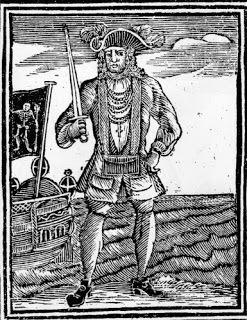 Black BartSo why did men, and some women, turn to piracy? Was it for the treasures? For fame? Oh sure, there was adventure. Make no mistake, the hours were long, the work hard and dangerous. There was starvation, sickness, and overwhelming boredom. Heck, death was a constant on board. But there was also excitement and reward that came with taking a bountiful prize or leading a successful raid. Pirates worked hard but partied harder, usually blowing all their earnings on food, drink, gaming, and women. Life was short. Those fleeting chances to live with abandon was worth every bit the effort and risks.
Black BartSo why did men, and some women, turn to piracy? Was it for the treasures? For fame? Oh sure, there was adventure. Make no mistake, the hours were long, the work hard and dangerous. There was starvation, sickness, and overwhelming boredom. Heck, death was a constant on board. But there was also excitement and reward that came with taking a bountiful prize or leading a successful raid. Pirates worked hard but partied harder, usually blowing all their earnings on food, drink, gaming, and women. Life was short. Those fleeting chances to live with abandon was worth every bit the effort and risks.
While selfish gain had much to do with going on the account, it was rarely as simple as to get rich. There were more compelling factors that lead men to piracy.
Turning pirate might be seen as the lesser evil or a means to freedom. People rarely rose above their caste. Individual freedom and human rights did not exist and justice was not universal nor always fair. Most people in Western Europe, whether rural or urban, lived in extreme poverty. Hard work didn’t equal high wages and jobs were scarce, especially for those without a skill or education. Good people were forced to become thieves to survive. Many turned to the docks for better employment opportunities.
Signing on to work a merchant ship brought wages and men might learn a trade, such as carpentry, at sea that could give them greater chances for employment on land. Unfortunately, conditions at sea were harsh and pay not guaranteed. Men worked excessively long hours on under-crewed ships and were often cheated by unscrupulous merchants should voyages not be profitable enough.
Joining the navy wasn’t much better. In fact, it could have very well been worse, even if enlisting kept a man out of debtor’s prison. Just as with most ships, conditions on board were brutal and wages might not ever be paid. The British Royal Navy had difficulty finding willing men to recruit and had established the Impress Service. This organization was little more than a gang of rough and tough wharf laborers authorized to forcibly press men into navy service. Scores of men and boys were kidnapped, tricked, beaten, shackled and dragged, and otherwise press-ganged, onto naval ships. No able-bodied male was safe. Not even in their own homes. Not even the men that made up the Impress Service.
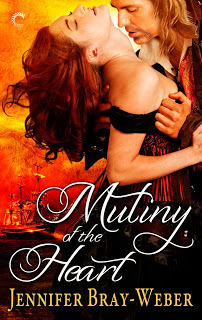 Got action + love triangle? Click cover for more!Piracy presented an escape from conscription tactics, corrupt merchants, and “honest” work from merchants and navies.
Got action + love triangle? Click cover for more!Piracy presented an escape from conscription tactics, corrupt merchants, and “honest” work from merchants and navies.
Pirates, for the most part, offered a democracy, equal pay, revolving work hours, fair judgment and punishment, workmen’s compensation for injuries, and a voice. It did not matter the class, race, religion, they were treated the same. This gave men freedom that they probably wouldn’t have had otherwise, on land or sea. And freedom is a powerful reason.
Some pirates started out as lawful pirates called privateers. These men were commissioned by their governments (with letters of marque) to attack enemy ships or ports during times of war and shared the gains with their investors. But war between any given nation was sporadic. If news of peace hadn’t reached a privateer, an attack on an enemy that had suddenly become an ally would mean an act of piracy. At any rate, if the profits were good, privateers would have been hard to persuade back into legitimate commerce. One such famous captain who had been a privateer accused of piratical deeds was Captain Kidd. Kidd was captured, tried, found guilty of piracy, and hung.
[Side note. Becoming a pirate wasn’t always a choice. As an example, some men were forced to join the crew, and usually for their skill. Carpenters, navigators, and surgeons were among the experienced spared and/or snatched off an overtaken ship.]
No, the allure of piracy wasn’t always for fortune, but of circumstance or a way out of oppression.
Pirate Bartholomew Roberts, also known as Black Bart, said it best.
He also said:
About the Author
Jennifer Bray-Weber is the award-winning author of the Romancing the Pirate series. Visit her at www.jbrayweber.com or join her mailing list for sneak peeks, excerpts, and giveaways.
 Black BartSo why did men, and some women, turn to piracy? Was it for the treasures? For fame? Oh sure, there was adventure. Make no mistake, the hours were long, the work hard and dangerous. There was starvation, sickness, and overwhelming boredom. Heck, death was a constant on board. But there was also excitement and reward that came with taking a bountiful prize or leading a successful raid. Pirates worked hard but partied harder, usually blowing all their earnings on food, drink, gaming, and women. Life was short. Those fleeting chances to live with abandon was worth every bit the effort and risks.
Black BartSo why did men, and some women, turn to piracy? Was it for the treasures? For fame? Oh sure, there was adventure. Make no mistake, the hours were long, the work hard and dangerous. There was starvation, sickness, and overwhelming boredom. Heck, death was a constant on board. But there was also excitement and reward that came with taking a bountiful prize or leading a successful raid. Pirates worked hard but partied harder, usually blowing all their earnings on food, drink, gaming, and women. Life was short. Those fleeting chances to live with abandon was worth every bit the effort and risks.While selfish gain had much to do with going on the account, it was rarely as simple as to get rich. There were more compelling factors that lead men to piracy.
Turning pirate might be seen as the lesser evil or a means to freedom. People rarely rose above their caste. Individual freedom and human rights did not exist and justice was not universal nor always fair. Most people in Western Europe, whether rural or urban, lived in extreme poverty. Hard work didn’t equal high wages and jobs were scarce, especially for those without a skill or education. Good people were forced to become thieves to survive. Many turned to the docks for better employment opportunities.
Signing on to work a merchant ship brought wages and men might learn a trade, such as carpentry, at sea that could give them greater chances for employment on land. Unfortunately, conditions at sea were harsh and pay not guaranteed. Men worked excessively long hours on under-crewed ships and were often cheated by unscrupulous merchants should voyages not be profitable enough.
Joining the navy wasn’t much better. In fact, it could have very well been worse, even if enlisting kept a man out of debtor’s prison. Just as with most ships, conditions on board were brutal and wages might not ever be paid. The British Royal Navy had difficulty finding willing men to recruit and had established the Impress Service. This organization was little more than a gang of rough and tough wharf laborers authorized to forcibly press men into navy service. Scores of men and boys were kidnapped, tricked, beaten, shackled and dragged, and otherwise press-ganged, onto naval ships. No able-bodied male was safe. Not even in their own homes. Not even the men that made up the Impress Service.
 Got action + love triangle? Click cover for more!Piracy presented an escape from conscription tactics, corrupt merchants, and “honest” work from merchants and navies.
Got action + love triangle? Click cover for more!Piracy presented an escape from conscription tactics, corrupt merchants, and “honest” work from merchants and navies.Pirates, for the most part, offered a democracy, equal pay, revolving work hours, fair judgment and punishment, workmen’s compensation for injuries, and a voice. It did not matter the class, race, religion, they were treated the same. This gave men freedom that they probably wouldn’t have had otherwise, on land or sea. And freedom is a powerful reason.
Some pirates started out as lawful pirates called privateers. These men were commissioned by their governments (with letters of marque) to attack enemy ships or ports during times of war and shared the gains with their investors. But war between any given nation was sporadic. If news of peace hadn’t reached a privateer, an attack on an enemy that had suddenly become an ally would mean an act of piracy. At any rate, if the profits were good, privateers would have been hard to persuade back into legitimate commerce. One such famous captain who had been a privateer accused of piratical deeds was Captain Kidd. Kidd was captured, tried, found guilty of piracy, and hung.
[Side note. Becoming a pirate wasn’t always a choice. As an example, some men were forced to join the crew, and usually for their skill. Carpenters, navigators, and surgeons were among the experienced spared and/or snatched off an overtaken ship.]
No, the allure of piracy wasn’t always for fortune, but of circumstance or a way out of oppression.
Pirate Bartholomew Roberts, also known as Black Bart, said it best.
For I have dipped my hands in muddied waters, and, withdrawing them, find 'tis better to be a commander than a common man.
He also said:
In an honest service there is thin commons, low wages, and hard labor; in this, plenty and satiety, pleasure and ease, liberty and power; and who would not balance creditor on this side, when all the hazard that is run for it, at worst, is only a sour look or two at choking. No, a merry life and a short one, shall be my motto.
About the Author
Jennifer Bray-Weber is the award-winning author of the Romancing the Pirate series. Visit her at www.jbrayweber.com or join her mailing list for sneak peeks, excerpts, and giveaways.
Published on April 12, 2016 02:00
April 5, 2016
A Topless Duel Between Two Women of Nobility By Kathleen Bittner Roth
Welcome back to History Undressed, our regular first Tuesday blogger
and author, Kathleen Bittner Roth!
Kathleen Bittner Roth! Today she's got a fascinating and scandalicious article for us. Enjoy!
A Topless Duel Between Two Women of NobilityBy Kathleen Bittner Roth
Six years ago, in an unscheduled move, I ended up living in Budapest, Hungary where I promptly fell in love—with the city, with the people, and with the country’s intriguing history. Recently, I came across a fascinating true story about a duel that took place between a Hungarian princess and a Russian countess where both women fought half-naked.
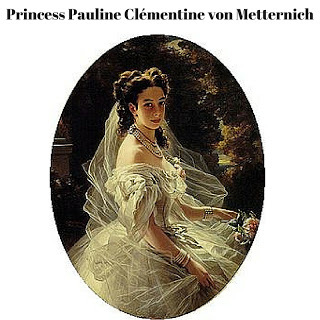
Princess Pauline Clémentine von Metternich (02/18/1836 – 09/28/1921) was born into a Hungarian/Viennese noble family. Her father, Count Clemens von Metternich, was well-known throughout the Habsburg Empire as a superior equestrian. Her mother was the daughter of Austrian Chancellor Prince Klemens Wenzel Von Metternich.

Elegant and charming, albeit a bit headstrong after growing up in her grandfather’s Viennese palace, Pauline became a famous Parisian and Viennese socialite who did whatever she darn well pleased. She was a serious patron of the arts who promoted composers and authors such as Richard Wagner, Franz Liszt, and Alexander Dumas. She also put couturier Frederick Worth on the map with his famous House of Worth designs, many of which the princess wore with élan. Pauline spoke several languages, wrote two books, one in German and one in French, and still found time to teach women to smoke cigars and aristocrats to skate.
Princess Pauline also became a countess when she married her uncle, the chancellor’s son (her mother’s half-brother), Prince Richard von Metternich. She accompanied her husband on his diplomatic missions to the royal court in Dresden, and to the Imperial Court in Paris where she befriended French Empress Eugenie, wife of Emperor Napoleon III. She stood by Eugenie’s side during the war and most likely saved her life by smuggling the Empress’s jewels to England in a diplomatic pouch.

In the summer of 1892, Princess Pauline fought a duel with Countess Anastasia Kielmannsegg, a highly ambitious Russian royal. Historically, women sometimes had male champions duel on their behalf. However, in late 19th century Europe, new women were encouraged to fight for themselves. Nonetheless, it was highly unusual for women to be crossing swords, let alone bare-chested.
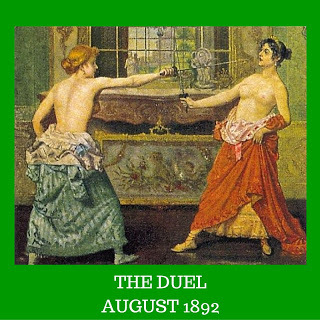
Not only did these two women challenge each other, the duel became an emancipated one when Pauline chose Princess Schwarzenberg as her second, and Countess Anastasia chose Countess Kinsky as her second (a driver and male attendant were on hand but they were ordered to stand by the wagons with their backs turned).
Enter Baroness Lubinska, a Polish woman who held a degree in medicine. Chosen as the surgeon to oversee the duel, the baroness insisted Pauline and Anastasia fight topless to avoid any pieces of fabric getting jammed into a wound which could cause sepsis to set in. So the noble ladies, determined as they were to duel to the end, removed their upper body clothing, and the duel commenced. According to French rules, they were to fight to first blood using rapiers.
Countess Anastasia claimed victory as drawing first blood when Princess Pauline got nicked on the nose. Princess Pauline, on the other hand, claimed victory because her wound to Anastasia’s arm was much deeper.
Oh, yes. You might be wondering what this duel was about. It seems these two headstrong women were at odds over arrangements for the Vienna Musical and Theatrical Exhibition—some say flower arrangements; others say musical arrangements. However, as I researched the event here in Hungary, I learned there had been an ongoing fierce rivalry between Princess Pauline and Countess Anastasia over who stood on the highest rung of the social ladder. The Countess Anastasia, who was very ambitious, and apparently had a well-known talent for arranging entertainments of all kinds, stole the spotlight from Princess Pauline at every opportunity which infuriated Pauline.
So there you have it—another intriguing peek into history, and the lives of strong, noble women who dared to step outside the rules of the day. No wonder the topless duel between Princess Pauline and Countess Anastasia made headlines around the world.
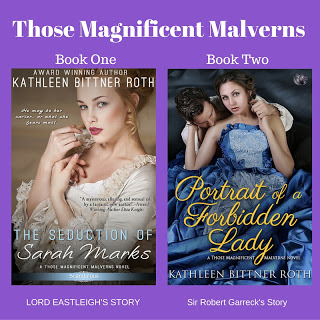
Kathleen Bittner Roth thrives on creating passionate stories featuring characters who are forced to draw on their strength of spirit to overcome adversity and find unending love. Her own fairy tale wedding in a Scottish castle led her to her current residence in Budapest, Hungary, considered one of Europe’s most romantic cities. However, she still keeps one boot firmly in Texas and the other in her home state of Minnesota. A member of Romance Writers of America®, she was a finalist in the prestigious Golden Heart® contest. Find Kathleen on Facebook, Goodreads, Twitter, Pinterest and www.kathleenbittnerroth.com.
PORTRAIT OF A FORBIDDEN LADY is book two in Those Magnificent Malvern series and is due to release in March 21, 2016 (cover not yet available): A young widow returns to her childhood home after a forced absence and faces her first and only love, but despite their powerful attraction, danger compels her to remain his forbidden lady. ORDER YOUR COPY!
THE SEDUCTION OF SARAH MARKS is book one in Those Magnificent Malvern series: When a proper Victorian miss awakens next to a handsome stranger, she must rely on the man's benevolence as she struggles to regain her memory and hold onto her heart. ORDER YOUR COPY!
A Topless Duel Between Two Women of NobilityBy Kathleen Bittner Roth
Six years ago, in an unscheduled move, I ended up living in Budapest, Hungary where I promptly fell in love—with the city, with the people, and with the country’s intriguing history. Recently, I came across a fascinating true story about a duel that took place between a Hungarian princess and a Russian countess where both women fought half-naked.

Princess Pauline Clémentine von Metternich (02/18/1836 – 09/28/1921) was born into a Hungarian/Viennese noble family. Her father, Count Clemens von Metternich, was well-known throughout the Habsburg Empire as a superior equestrian. Her mother was the daughter of Austrian Chancellor Prince Klemens Wenzel Von Metternich.

Elegant and charming, albeit a bit headstrong after growing up in her grandfather’s Viennese palace, Pauline became a famous Parisian and Viennese socialite who did whatever she darn well pleased. She was a serious patron of the arts who promoted composers and authors such as Richard Wagner, Franz Liszt, and Alexander Dumas. She also put couturier Frederick Worth on the map with his famous House of Worth designs, many of which the princess wore with élan. Pauline spoke several languages, wrote two books, one in German and one in French, and still found time to teach women to smoke cigars and aristocrats to skate.
Princess Pauline also became a countess when she married her uncle, the chancellor’s son (her mother’s half-brother), Prince Richard von Metternich. She accompanied her husband on his diplomatic missions to the royal court in Dresden, and to the Imperial Court in Paris where she befriended French Empress Eugenie, wife of Emperor Napoleon III. She stood by Eugenie’s side during the war and most likely saved her life by smuggling the Empress’s jewels to England in a diplomatic pouch.

In the summer of 1892, Princess Pauline fought a duel with Countess Anastasia Kielmannsegg, a highly ambitious Russian royal. Historically, women sometimes had male champions duel on their behalf. However, in late 19th century Europe, new women were encouraged to fight for themselves. Nonetheless, it was highly unusual for women to be crossing swords, let alone bare-chested.

Not only did these two women challenge each other, the duel became an emancipated one when Pauline chose Princess Schwarzenberg as her second, and Countess Anastasia chose Countess Kinsky as her second (a driver and male attendant were on hand but they were ordered to stand by the wagons with their backs turned).
Enter Baroness Lubinska, a Polish woman who held a degree in medicine. Chosen as the surgeon to oversee the duel, the baroness insisted Pauline and Anastasia fight topless to avoid any pieces of fabric getting jammed into a wound which could cause sepsis to set in. So the noble ladies, determined as they were to duel to the end, removed their upper body clothing, and the duel commenced. According to French rules, they were to fight to first blood using rapiers.
Countess Anastasia claimed victory as drawing first blood when Princess Pauline got nicked on the nose. Princess Pauline, on the other hand, claimed victory because her wound to Anastasia’s arm was much deeper.
Oh, yes. You might be wondering what this duel was about. It seems these two headstrong women were at odds over arrangements for the Vienna Musical and Theatrical Exhibition—some say flower arrangements; others say musical arrangements. However, as I researched the event here in Hungary, I learned there had been an ongoing fierce rivalry between Princess Pauline and Countess Anastasia over who stood on the highest rung of the social ladder. The Countess Anastasia, who was very ambitious, and apparently had a well-known talent for arranging entertainments of all kinds, stole the spotlight from Princess Pauline at every opportunity which infuriated Pauline.
So there you have it—another intriguing peek into history, and the lives of strong, noble women who dared to step outside the rules of the day. No wonder the topless duel between Princess Pauline and Countess Anastasia made headlines around the world.

Kathleen Bittner Roth thrives on creating passionate stories featuring characters who are forced to draw on their strength of spirit to overcome adversity and find unending love. Her own fairy tale wedding in a Scottish castle led her to her current residence in Budapest, Hungary, considered one of Europe’s most romantic cities. However, she still keeps one boot firmly in Texas and the other in her home state of Minnesota. A member of Romance Writers of America®, she was a finalist in the prestigious Golden Heart® contest. Find Kathleen on Facebook, Goodreads, Twitter, Pinterest and www.kathleenbittnerroth.com.
PORTRAIT OF A FORBIDDEN LADY is book two in Those Magnificent Malvern series and is due to release in March 21, 2016 (cover not yet available): A young widow returns to her childhood home after a forced absence and faces her first and only love, but despite their powerful attraction, danger compels her to remain his forbidden lady. ORDER YOUR COPY!
THE SEDUCTION OF SARAH MARKS is book one in Those Magnificent Malvern series: When a proper Victorian miss awakens next to a handsome stranger, she must rely on the man's benevolence as she struggles to regain her memory and hold onto her heart. ORDER YOUR COPY!
Published on April 05, 2016 00:30
March 31, 2016
$3,000 Big Romance Author Spring Giveaway
 Big Romance Author $3,000 Spring Giveaway April 1-30th, 2016
Big Romance Author $3,000 Spring Giveaway April 1-30th, 2016Attention all awesome people! This month is a cool time to be a reader. 101 of your favorite authors contributed to one massive giveaway! Giveaway rules are listed on the rafflecopter. International peeps can play! Got any questions? Feel free to ask. There are 100 ways to enter for a maximum possible 500+ entries per person. The giveaway lasts the entire month of April, so come back every day and hammer away at a few more entries until you're all done! ONE PERSON WILL WIN $3,000 USD! That's the biggest giveaway I've seen recently! Tell your buds! Don't miss out. You'll kick yourself if you miss this one.
a Rafflecopter giveaway Terms & conditions are listed on the rafflecopter. Read it for full details. The winner will be chosen on May 1, 2016 and contacted via the email address they used to enter. CHECK YOUR EMAIL! The winner's name will also be posted on the rafflecopter widget above. Participating Romance Authors: 101 different authors came together to make this giveaway possible. If you've been looking for a new book boyfriend, or you're literally famished between your fave author's releases, check out some of my peeps! They write in various hot romance genres including contemporary romance, new adult romance, erotic romance, steamy romance, urban fantasy romance, dystopian romance, historical romance, futuristic/ sci-fi/ fantasy romance, Teen/ YA romance, inspirational romance and time travel romance!
 Big Romance Author $3,000 Spring Giveaway April 1-30th, 2016
Big Romance Author $3,000 Spring Giveaway April 1-30th, 2016H.M. Ward
Kim Golden
Drew Jordan
Christi Caldwell
Scarlett Metal
Chris Almeida & Cecilia Aubrey
Heidi McLaughlin
Jenny Gardiner
Stacey Joy Netzel
Merry Farmer
Mallory Crowe
Julia Kent
Jean Oram
Vella Day
Meli Raine
Sherri HayesJ
ayne RylonS
arah M. Cradit
Erica Ridley
Christine Zolendz
Beverly Preston
Marquita Valentine
Melissa Storm
Dana Marton
Amy Bartol
Michelle Fox
Magan Vernon
Ainsley Booth
Venessa Kimball
Sidney Bristol
K.M. Scott
C.C.Wood
J.M. Miller
Zara Keane
Eliza Knight
L.P. Dover
Sadie Haller
Patricia McLinn
Suzanne Rock
Katherine Lowry Logan
Erin Richards
Tori Scott
Danielle Stewart
P.T. Michelle
Suzan Tisdale
T.M. Franklin
Evelyn Adams
S.E. Hall
Lauren Hawkeye
Josie Bordeaux
Melanie Marchande
Raci Ames
Catherine Gayle
Sam Cheever
J.M ColeBrooke Blaine
Ella Frank
Allison BellCristin Harber
Jacki Delecki
Tawdra Kandle
Sydney Logan
Laura Kaye
Laura Kamoie
Evie Harper
P.J. Fiala
Taylor Law
Pamela DuMond
D.L. Roan
Jenni Moen
LG Castillo
Rachel Schurig
Nina Levine
Rachel Hanna
Cheryl Bradshaw
Jessica Scott
Beth Yarnall
J.T. Geissinger
Stacey Mosteller
Kylie Gilmore
Maryann Jordan
Cari Quinn
Lauren Royal
Renea Mason
Christine Bell
Felicia Tatum
Fabio Bueno
RaShelle Workman
Nana Malone
Annika Martin
Sophia Knightly
Nikki Lynn Barrett
Marian Tee
Sarah Castille
Allyn Lesley
Ambrielle Kirk
Jami Davenport
Bonnie R. Paulson
Laura Stapleton
Kennedy Layne
Published on March 31, 2016 18:13
New Release! CLAIMED BY THE WARRIOR by Eliza Knight
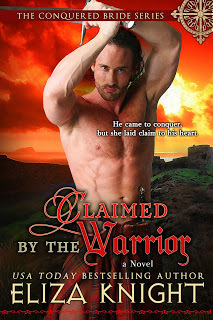 I'm thrilled for the 3rd book in my Conquered Bride series to hit the virtual shelves today--CLAIMED BY THE WARRIOR. How about a look at the first chapter??? I hope you enjoy!
I'm thrilled for the 3rd book in my Conquered Bride series to hit the virtual shelves today--CLAIMED BY THE WARRIOR. How about a look at the first chapter??? I hope you enjoy!ABOUT THE BOOK:
He came to conquer…
A widower, Laird Torsten Mackenzie, has worked long and hard to regain the respect his clan deserved after his older brother turned traitorous. Even in death, Cathal’s crimes remain a mar on Torsten’s conscience. Setting aside his grief, Torsten devotes his life to his people, and to his young, motherless daughter. When a rival clan attacks his lands unprovoked, he’s determined to put them in their place once and for all. Marching on their gates, he’s taken by surprise when Lady MacDonell steps through the opening instead of her wayward husband. Reacting impulsively, Torsten exacts his revenge by whisking her away.
But she laid claim to his heart...
Headstrong and fierce, Éabha MacDonell’s true nature has been buried for six long years in a marriage that fills her with shame, and has kept her tucked in the shadows. But the death of her husband, and being forced from the only home she’s ever known, brings freedom in a way she’d never imagined. Free to rediscover parts of herself she’d thought never to behold again—her love of art, fencing, and her desire for children. But most of all, the tug at her heart, the warmth of a secret glance and the heat of a passionate embrace.
In the arms of her captor, Éabha’s more liberated than she’s ever been before and Torsten might just have found the one person who can make him whole again.
EXCERPT: Chapter One
Strome CastleScottish HighlandsSpring, 1308
Damned MacDonells.Why the hell did those bloody fools have to keep raiding? Had they not yet learned their lesson?Laird Torsten Mackenzie crouched just out of arrow’s reach from the high, thick walls of the MacDonell’s castle. The fortress loomed up in the moonlight, but despite its fortifications, he planned to breach it this very night. A promise he’d made the last time the bastards had dared to cross onto his land.Torsten was certain he’d been clear that any further raids on his lands would not be tolerated. Another raid from the MacDonells was a declaration of war, he’d even put it in writing so the imbeciles would not be confused. Yet, despite his warnings, the arseholes had done so again, trampling crops, burning crofter’s homes, beating tenants and violating women.Rage lanced hot through Torsten’s veins. He gripped the reins tighter, his body stiffened, and his mount, Lucifer, tossed his head in irritation. When he got ahold of Donald MacDonell, that sorry excuse for a laird, he was going to beat him to a bloody pulp, until the last of his breath escaped and his face was unrecognizable.His warhorse snorted and Torsten loosened his grip, concentrating his fury on the castle just beyond.“My laird?”Torsten glanced at Little Rob, his second-in-command, a man not so little in personality or size. He, too, had steel-studded leather armor covering his leine shirt, his green and blue plaid muted in the darkness.“Wait.” Torsten glowered at the wall and keep, imagining the men inside celebrating their latest raid, and reliving every horrifying moment. Well, Torsten, wasn’t celebrating, and his people surely weren’t. They were trying to pick up the pieces of their lives, while desperately trying not to relive it. Donald MacDonell had better start praying now, for Torsten would show no mercy.Mackenzie lands were vast. Torsten’s castle, Eilean Donan, sat on an island perfectly situation between three lochs—Loch Alsh, Loch Duich and Loch Long—on the south-western end of his territory. The MacDonell’s had crossed through their own territory traveling north into Mackenzie lands, but been careful to stay as far away from the castle as possible, riding more than half a day, longer than needed, until they reached a small village built along a river. Torsten had a small garrison stationed there, but the MacDonells had more men and despite the Mackenzie superior strength and skill, the men were killed or left for dead. By the time a messenger had arrived, and Torsten had brought reinforcements, the MacDonells were long gone.Torsten set out immediately, sending word to Eilean Donan for more of his men to meet him at Strome Castle. They all gathered now, nearly one hundred and fifty strong.The idea of any warrior tormenting an innocent sent his guilt soaring fast. He’d dealt with enough of that with his own brother, God rest his soul. Whenever Cathal had gone raiding, Torsten stayed home, just waiting for someone to seek vengeance on his brother until the day it actually happened. Torsten thought himself a defender of the weak. A protector of those who needed it. He was laird and chief of a vast and powerful clan, it was his duty, and he was honor-bound, to keep every single one of them safe.And yet, he was still dealing with the fallout of his brother’s choices. One day, one battle, one victory at a time.“They’ll be expecting us,” Torsten growled.Little Rob nodded, the leather of his armor making a stretching noise as he shifted on his mount. “Do ye want to meet them on the field, or breach their walls?”Torsten surveyed his warriors, each had painted a black stripe in the shape of cross down the center of their forehead, himself included. His men had lost friends this night. Loved ones. And Torsten had once more failed to protect his people.“I want to kill them all.” Torsten fingered the hilt of his sword. “But I won’t. Not the innocent. We’ll not stoop to MacDonell’s level.”“Aye, my laird.”“Give the order. No woman, child or person of aged years is to be harmed. If a man surrenders, tie him up, dinna dispatch him. And most of all, remember that MacDonell is mine.”“And his wife?”“His wife?” Torsten frowned, he’d not considered the lady.Most likely she was a vile wench. Anyone married to MacDonell, their choice or not, had to be dreadful.Torsten was not married, though he had been once. His wife had died several years ago in childbirth. He’d not remarried, first, because of grief, and then, because of his brother’s traitorous actions. The imbecile had sought to marry in order to betray his king. A coup it had been, and he’d been killed for it. Torsten mourned the loss of his brother, but had spent the last two years trying to salvage the reputation of his clan, and himself as a leader and loyalist to King Robert the Bruce. There’d been no time for women, and he wasn’t certain any would have wanted him anyway.“She’s to be left unharmed.” Torsten gritted his teeth and eyed Loch Carron, mesmerized by the way the moon glittered on its dark depths. Across the loch was his beloved Eilean Donan. How he wished he was there right now. Worry free and drinking a whisky behind the stone walls. Lord, how he could go for a drink presently—another thing he’d resisted since his brother’s death.Instead, he was leading an attack because some arseholes were too stupid or greedy for their own good. Donald MacDonell was both. To gain some ground Torsten and his men had to ride around the loch, which had taken four hours, but they’d been hot on the heels of the bloody bastards the entire way. They were lucky for a clear sky and bright moon, else they’d have a harder time fighting, and he wasn’t willing to wait until morning.His charger shifted beneath him, restless to engage, just like his master. Torsten’s gaze followed the line of the battlements. He was unsure of exactly what he was looking for, a sign perhaps, but what? Every time they went into battle, he felt it. That subtle hint that it was time to launch forward. Call him superstitious, mayhap, but he refused to begin a battle without it. And so, when dawn was on the brink of arrival and no sign had presented itself, he’d not yet advanced.’Twas bad enough that he had to worry about the English and their constant attacks, but he shouldn’t have to worry over neighboring clans as well. He supposed this was just another mess his brother had left for him to clean up. Cathal hadn’t been good at making allies, only enemies it would seem.A prickle rose along his spine, tingling the back of his neck. Finally. “’Tis time,” he said.Little Rob nodded. “We are ready.”Torsten slid his sword from its scabbard and raised it over his head. Then pointed it forward, remaining silent. The enemy might suspect that they would soon be upon them, but they wouldn’t announce their arrival with a resounding battle cry just yet. Besides, if the MacDonells were stupid enough to continue raiding Mackenzie lands, ’haps they were stupid enough to leave their gates wide open for invasion.They advanced quietly over the mist covered heath, their horses’ steps silenced by the fresh spring growth of grass and wild flowers. The horizon winked purple and pink, but left shadows across the land. They kept a slow, steady pace, not wanting the pounding of galloping hooves to alert the guards.But, even the most well intentioned plans sometimes had to be modified. Halfway across the heath, the sound of an alarm went up over the battlements. They’d been spotted.Excellent.Torsten’s grin grew wide, excitement and anger boiling together into a potent fire that thrummed through his veins.“Forward!” Torsten bellowed, leaning over Lucifer’s withers, urging him into a full gallop.His men followed suit.Torsten kept his gaze keen on the castle walls, seeing men line up one after another, their weapons and armor glinting. The gate master called for archers. ’Twas too late to turn around now.“Shields!” Torsten shouted to his warriors, recognizing the whistle as the arrows flew through the air.The Mackenzies wouldn’t let a few arrows stop them. They continued at a full gallop, shields raised. Nothing could stop them, they advanced toward the gates, not slowing down even as arrows rained down upon them. Only a few men fell, and Torsten prayed for them, his vow for revenge only growing as his losses increased. Four down. Five.Donald MacDonell was a dead man.Just as suddenly as the arrows had sang through the air, they ceased.As odd as that was, Torsten forged ahead. This was all out war.Then something even odder occurred. When they were only yards from the wall, his warriors ready to throw up their hastily made ladders, the portcullis slowly started to raise.Warriors. The MacDonells were sending men out to battle. Torsten let his battle cry tear from his throat, ready to sink his blade into the first man who stepped through.But then he was stunned, almost paralyzed, when a willowy figure walked through the gates carrying a torch. A woman.What in bloody hell?Her skirts blew against her ankles, and clung to her thighs. Her eyes searched his, challenging him to stop, mesmerizing him for a moment until he realized just what was happening.“Halt!” Torsten roared, bringing Lucifer to a standstill. “What trickery is this?”Was the MacDonell such a coward he would send a woman out as bait? A consolation prize?Torsten glowered at her, his stomach twisting in burning knots of rage.The woman was tall, thin. Her light hair billowed in the breeze and shimmered in the moonlight. Her features were obscured half in shadow and half in golden light from the torch. She was beautiful. Cheekbones high, jaw strong, nose regal and her mouth, well, he had to tear his gaze from the lush sight.She held up her hand, a silent entreaty for him to stop. “My laird,” she called. “There is no need to attack.”Her words, spoken with such calm strength only made him angry. His back stiffened, and Lucifer let out an annoyed snort when he tightened the reins. “No need? There is much need, my lady. Go back inside and send out your laird. He will pay for what he’s done.”She looked at him with sadness in her gaze and shook her head. “He’ll not be coming out.”Torsten resisted the urge to leap from his horse in order to throttle the woman for her insolence.“Go back inside, woman. This is a man’s business, and I intend to speak with your laird.”She straightened her shoulders, lifting her chin. “I am speaking in his place.”“I’ll not speak with MacDonell’s bait. One last warning—send out the laird.”Or else what?Her raised brow seemed to dare him to answer that question as well. And how could he? He’d not hurt her. Torsten had never harmed a woman, he’d never ill-used one, and he wasn’t about to start now.“Do it,” he demanded, inching his horse just a step forward, hoping to intimidate her.“I canna. Please, let us settle this between the two of us,” she pleaded, her free hand beseeching. “There is no need for a battle, or for more to get hurt.”“So ’tis all right to kill and torture my people, but we must stop at your doors? Ye beg for the lives of your people, your laird, and yet what mercy was given to my people today? The past month? The past year? None. MacDonell has killed my people, ruined our crops, stolen our cows. I warned him that the next time he came raiding, he was inviting war to his door. And here I am, lassie. I am war. I am revenge.”Why was he explaining all this to a wisp of a woman? To any woman for that matter.His tirade only seemed to make her stand taller. If her chin grew any more obstinate she’d be staring at the sky. “If ye are war, then I am peace.”“Peace? Who are ye?” Torsten asked. “What gives ye the authority to negotiate? Send out a man.”Her hand fisted at her side, and the torch flickered against her tight hold. She glowered up at him with such ferocity, Torsten was certain to remember the look for years to come. No woman that he’d ever known had exhibited such strength. For a moment, he was actually impressed.“I am Éabha MacDonell.”The name should have rung familiar to him, but it did not. The laird’s sister? Daughter? Wife? He had no idea.“And?”“I am the Mistress of Strome.”Ah, MacDonell’s wife. “Send your husband then, my lady, for I will not negotiate with ye.”She stood her ground. “Ye will have to.”“And if I refuse?”Now he was challenging her to come up with a different answer.“Then it is a battle ye shall receive.” Disappointment flashed in her eyes.Torsten grunted. “Then ye shall watch your people die as I have had to watch mine.”Sadness filled her flame-lit features. “I am sorry for the loss of your people.”Torsten grimaced. “I do not care if ye are sorry. Sorry will not bring them back. Sorry will not stop me from seeking vengeance.”“Neither will battle.”“But ye see, my lady, this is not why we do battle. We battle for revenge. For payment. We battle to teach your husband and his men a lesson.”“What lesson will they learn?”Torsten growled. He’d had enough. If MacDonell wanted to send his wife to do a man’s job, then fine. He’d teach the bastard a lesson in diplomacy. Leaping from his mount, Torsten sheathed his claymore, held up his hands, and slowly approached Lady Éabha. She watched him warily, taking a few steps back. On the battlements, her guards scrambled, shouted and wrenched back their bows. She held up her hand, and called for them to stand down.“What are ye about?” she said, her voice strong, though her eyes seemed to fill with fear the closer he came.“Ye want to negotiate.” Torsten kept his voice low, smooth, the way he talked to a colt he was trying to break. He held his arms out to the side, disarming her.“Aye.” She stopped moving backward, her shoulders relaxing slightly.“I dinna negotiate from atop a horse.” He continued slowly moving forward.She cocked her head as if trying to decipher just what that meant. Her guard was down for less than a moment. But it was enough. And Torsten took full advantage. Moving with lightning speed, he grabbed her by the arm and whipped her round. Her back slammed against his chest, and he pulled a sgian dubhfrom inside his sleeve, holding it at her throat.“Dinna shoot, unless ye want your mistress to die,” Torsten hollered to the men on the walls, pressing the tip of his blade against her flesh.“Do as he says,” Lady Éabha called, using much of her strength to try and launch herself away from him. Failing miserably, she gripped onto his forearms and held on for dear life. “I will be all right.”“If your laird wants her back, he knows where to find me.” Torsten backed toward Lucifer, the woman incredibly calm in his grasp, though her nails dug into his flesh.He breathed in her sweet scent, annoyed that he’d even noticed at all. She smelled of sugar and spice, like decadent baked treats that had him salivating.As they reached Lucifer’s side, he said, “Get on the horse.”“But I—”Torsten didn’t wait to hear her protests, he simply shoved her up where she belonged and climbed behind her. Lord, her body felt nice settled between his thighs. Disgusted with himself, with her, for certainly she was a wench, he held his blade at her throat.“Dinna speak,” he ordered.Slowly he backed his horse away, his men eyeing him as though he’d just told them to find a dragon in the field.“Ride,” he shouted, irritated at their censure. Perhaps mostly because he was irritated at himself. What in bloody hell was he thinking?They raced over the moors. No battle waged.He’d abducted the wife of his enemy. Only a man truly mad would do such a thing. This was something Cathal would do. Not Torsten. But it was too late to turn back now. He couldn’t very well return her to Strome with his apologies, nor could he just toss her to the ground and ride away.What had he done?He’d invited the enemy to his own doorstep, and there was a woman on his lap that made him want to lick every inch of her to see if she was as sweet as she smelled.A double blow.Revenge could not have gone any more wrong.
Available now at:AmazonB&NItunesKobo
Published on March 31, 2016 03:00
March 21, 2016
Spotlight: Portrait of a Forbidden Lady by Kathleen Bittner Roth
I'm thrilled to share with you my good friend, and History Undressed's regular first Tuesday blogger's newest release!!!
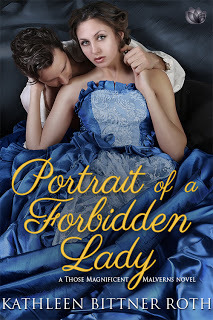 PORTRAIT OF A FORBIDDEN LADY Entangled Publishing
PORTRAIT OF A FORBIDDEN LADY Entangled Publishing
Release date: 03-21-16
Genre: Victorian Romance
Digital – 65,000 words
Book Two in the series - Those Magnificent Malverns - also a stand alone
A young widow returns to her childhood home after a forced absence and faces her first and only love, but despite their powerful attraction, danger compels her to remain his forbidden lady.
About the Book:
LADY GEORGIANA CRESSINGTON is living a nightmare. Coerced by her father into returning to her childhood home, the young widow becomes a pawn in his heartless game. Her return to Summerfield Hall reunites her with the man she once loved—before their hearts were shattered by a devastating betrayal.
SIR ROBERT GARRICK, an artist knighted by the queen, lives alone in a mansion near the family estate Georgiana’s duplicitous father won in a crooked card game. Rob sets out to regain Summerfield Hall to keep Georgiana’s son from inheriting Rob’s rightful home. However, when he and Georgiana are thrown together, he once again craves the forbidden lady he never stopped loving, and a passion that never died bursts into flames.
Facing danger and a long-hidden truth, Georgiana and Rob must confront a relentless enemy and heal the wounds on their souls in order to claim the powerful love that will restore their fractured hearts.
Excerpt:
Oh, dear, he’d read her mind. Her cheeks heated. “Don’t tell me you are going to stand in the middle of Charingham and flirt outrageously whilst everyone in the village looks on.”
He stood straight and tall, his hands clasped behind his back. While his eyes danced with merriment, there was no mistaking the fire banked in them as, once again, he openly studied her every movement. He leaned to her ear, his words a sensuous whisper. “Madame, I do not consider my frank confession to be an exercise in flirting, but if it will get me that kiss, then I shall commence with the task at once.”
“You are outrageous.”
“Indeed, and I thank you for noticing.”
She drew in a deep breath and spoke on the exhale. “I have learned there are four kinds of love, Rob. There is filial love, which the Malverns have barrels of—spilling over the top, I might add. There is romantic love, of which I have no desire to enter into ever again since I have no plans to marry. And then there is love of family.”
Rob lifted a brow. “The fourth?”
“Love of friends. Special friends.”
His eyes held steady with hers, and for a moment she felt as though her heart might burst. “And you wish for me to remain in your love of friends category?”
He stood before her for a long moment, his gaze powerful and penetrating. Then, with a little bow, he kissed her hand. “You are a remarkable woman who speaks well, and with a good deal of intelligence. But just now you spoke foolishly. After our foray by the pond, it has become clear you want me and I want you. Even though you have no desire to marry again, and I am not inclined to wed, we have not finished with each other. Until we do, what exists between us will eat away at our insides until there is nothing left of us, so let’s bring to an end whatever we started sixteen years ago, and then we’ll have this conversation again.”
Good God! She was at a loss for words.
Get Your Copy Today!
AmazonB&NITunesKobo
EntangledAbout the Author:
 Kathleen Bittner Roth thrives on creating passionate stories featuring characters who are forced to draw on their strength of spirit to overcome adversity and find unending love. Her own fairy tale wedding in a Scottish castle led her to her current residence in Budapest, Hungary, considered one of Europe’s most romantic cities. However, she still keeps one boot firmly in Texas and the other in her home state of Minnesota. A member of Romance Writers of America®, she was a finalist in the prestigious Golden Heart® contest. Find Kathleen on Facebook, Goodreads, Twitter, Pinterest and www.kathleenbittnerroth.com.
Kathleen Bittner Roth thrives on creating passionate stories featuring characters who are forced to draw on their strength of spirit to overcome adversity and find unending love. Her own fairy tale wedding in a Scottish castle led her to her current residence in Budapest, Hungary, considered one of Europe’s most romantic cities. However, she still keeps one boot firmly in Texas and the other in her home state of Minnesota. A member of Romance Writers of America®, she was a finalist in the prestigious Golden Heart® contest. Find Kathleen on Facebook, Goodreads, Twitter, Pinterest and www.kathleenbittnerroth.com.
 PORTRAIT OF A FORBIDDEN LADY Entangled Publishing
PORTRAIT OF A FORBIDDEN LADY Entangled Publishing Release date: 03-21-16
Genre: Victorian Romance
Digital – 65,000 words
Book Two in the series - Those Magnificent Malverns - also a stand alone
A young widow returns to her childhood home after a forced absence and faces her first and only love, but despite their powerful attraction, danger compels her to remain his forbidden lady.
About the Book:
LADY GEORGIANA CRESSINGTON is living a nightmare. Coerced by her father into returning to her childhood home, the young widow becomes a pawn in his heartless game. Her return to Summerfield Hall reunites her with the man she once loved—before their hearts were shattered by a devastating betrayal.
SIR ROBERT GARRICK, an artist knighted by the queen, lives alone in a mansion near the family estate Georgiana’s duplicitous father won in a crooked card game. Rob sets out to regain Summerfield Hall to keep Georgiana’s son from inheriting Rob’s rightful home. However, when he and Georgiana are thrown together, he once again craves the forbidden lady he never stopped loving, and a passion that never died bursts into flames.
Facing danger and a long-hidden truth, Georgiana and Rob must confront a relentless enemy and heal the wounds on their souls in order to claim the powerful love that will restore their fractured hearts.
Excerpt:
Oh, dear, he’d read her mind. Her cheeks heated. “Don’t tell me you are going to stand in the middle of Charingham and flirt outrageously whilst everyone in the village looks on.”
He stood straight and tall, his hands clasped behind his back. While his eyes danced with merriment, there was no mistaking the fire banked in them as, once again, he openly studied her every movement. He leaned to her ear, his words a sensuous whisper. “Madame, I do not consider my frank confession to be an exercise in flirting, but if it will get me that kiss, then I shall commence with the task at once.”
“You are outrageous.”
“Indeed, and I thank you for noticing.”
She drew in a deep breath and spoke on the exhale. “I have learned there are four kinds of love, Rob. There is filial love, which the Malverns have barrels of—spilling over the top, I might add. There is romantic love, of which I have no desire to enter into ever again since I have no plans to marry. And then there is love of family.”
Rob lifted a brow. “The fourth?”
“Love of friends. Special friends.”
His eyes held steady with hers, and for a moment she felt as though her heart might burst. “And you wish for me to remain in your love of friends category?”
He stood before her for a long moment, his gaze powerful and penetrating. Then, with a little bow, he kissed her hand. “You are a remarkable woman who speaks well, and with a good deal of intelligence. But just now you spoke foolishly. After our foray by the pond, it has become clear you want me and I want you. Even though you have no desire to marry again, and I am not inclined to wed, we have not finished with each other. Until we do, what exists between us will eat away at our insides until there is nothing left of us, so let’s bring to an end whatever we started sixteen years ago, and then we’ll have this conversation again.”
Good God! She was at a loss for words.
Get Your Copy Today!
AmazonB&NITunesKobo
EntangledAbout the Author:
 Kathleen Bittner Roth thrives on creating passionate stories featuring characters who are forced to draw on their strength of spirit to overcome adversity and find unending love. Her own fairy tale wedding in a Scottish castle led her to her current residence in Budapest, Hungary, considered one of Europe’s most romantic cities. However, she still keeps one boot firmly in Texas and the other in her home state of Minnesota. A member of Romance Writers of America®, she was a finalist in the prestigious Golden Heart® contest. Find Kathleen on Facebook, Goodreads, Twitter, Pinterest and www.kathleenbittnerroth.com.
Kathleen Bittner Roth thrives on creating passionate stories featuring characters who are forced to draw on their strength of spirit to overcome adversity and find unending love. Her own fairy tale wedding in a Scottish castle led her to her current residence in Budapest, Hungary, considered one of Europe’s most romantic cities. However, she still keeps one boot firmly in Texas and the other in her home state of Minnesota. A member of Romance Writers of America®, she was a finalist in the prestigious Golden Heart® contest. Find Kathleen on Facebook, Goodreads, Twitter, Pinterest and www.kathleenbittnerroth.com.
Published on March 21, 2016 00:00



